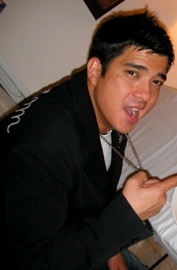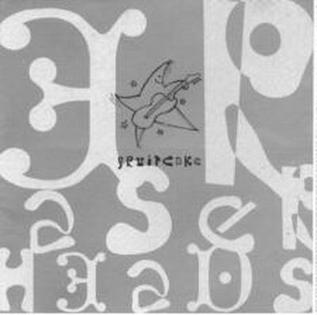Related Research Articles

Eraserheads are a Philippine alternative rock band formed in Quezon City in 1989. The band is composed of lead singer and primary songwriter Ely Buendia, guitarist Marcus Adoro, bassist Buddy Zabala, and drummer Raimund Marasigan. They are the most influential band in Philippine music history. Regarded as “the Beatles of the Philippines”, the band have sold 9 million copies of their discography throughout their career.

Eleandre Basiño “Ely” Buendia is a Filipino singer, musician, and songwriter. He is the lead vocalist and primary songwriter of the alternative rock band Eraserheads, with whom he has released seven albums since their founding in 1989.

Francis Michael Durango Magalona, also known as Francis M., was a Filipino rapper, singer, songwriter, television personality, actor, and entrepreneur. He is regarded as an influential figure in Pinoy hip hop.

Natin99 is the sixth studio album by the Philippine alternative rock band Eraserheads, released on May 18, 1999 by BMG Records (Pilipinas), Inc.

Eraserheads are a Philippine alternative rock band. Formed in Quezon City in 1989, the group consists of singer Ely Buendia, bassist Buddy Zabala, guitarist Marcus Adoro, and drummer Raimund Marasigan. The Eraserheads discography consists of seven studio albums, two live albums, five compilation albums, three extended plays (EP), 19 singles, two video albums and 13 music videos.

Cutterpillow is the third studio album by the Philippine alternative rock band Eraserheads, released on December 8, 1995 through BMG Records (Pilipinas), Inc.
"Ang Huling El Bimbo" is a song by the Philippine alternative rock band Eraserheads from their third album Cutterpillow (1995).

Circus is the second studio album by the Philippine alternative rock band Eraserheads, released on November 4, 1994 through BMG Records (Pilipinas) Inc.

Ultraelectromagneticpop! is the debut studio album by the Philippine alternative rock band Eraserheads, first released on July 1, 1993 by BMG Records (Pilipinas) Inc. It was produced by the band and Ed Formoso.

Fruitcake is the fourth studio album by the Philippine alternative rock band Eraserheads, released on December 6, 1996 by BMG Records (Pilipinas), Inc.

Sticker Happy is the fifth studio album by the Philippine alternative rock band Eraserheads, released on September 11, 1997 by BMG Records (Pilipinas) Inc.

Bananatype is the second extended play by the Philippine alternative rock band Eraserheads, released on June 1997 through BMG Records (Pilipinas), Inc. It serves as promotional material for the band’s fifth album Sticker Happy, which was released three months later.

Aloha Milkyway is a compilation album by the Philippine alternative rock band Eraserheads. It was released on August 12, 1998 under BMG Records (Pilipinas), Inc. in Southeast Asian territories and in the Philippines on October 14.
Pare Ko is a song by the Philippine alternative rock band Eraserheads. It was released as the second promotional single from their debut album, Ultraelectromagneticpop! (1993).
"Alapaap" is a song by the Philippine alternative rock band Eraserheads from their second album Circus (1994).

"With a Smile" is a song by the Philippine alternative rock band Eraserheads from their second album Circus (1993). It was later re-released in May 1999 as a promotional single for their compilation album Aloha Milkyway, released in 1998 for the Southeast Asian market.
"Ligaya" is a song by Filipino alternative rock band Eraserheads. It was released as their first promotional single from their debut album Ultraelectromagneticpop! (1993).
"Combo on the Run" is a song by the Philippine alternative rock band Eraserheads from their debut album Ultraelectromagneticpop! (1993).
"Kaliwete" is a song by the Philippine alternative rock band Eraserheads. It was released in August 1997 as the first promotional single from their fifth studio album Sticker Happy (1997).

"Spoliarium" is a song by the Philippine alternative rock band Eraserheads from their fifth album Sticker Happy (1997).
References
- ↑ "Soft of Hearing: The Sticker Happy Forum (Pillbox Vol. 3, page 12, 1998)". Schizo Archives. Retrieved 15 August 2024.
- ↑ Gatela, Mark Constantine C. "Sticker Happy review (The I-Site, September 1997)". Schizo Archives. Retrieved 14 August 2024.
- ↑ Sarne, Vernon B. "Happiness is a warm Eraserheads album (Philippine Daily Inquirer, October 25, 1997)". Schizo Archives. Retrieved 15 August 2024.
- 1 2 3 Torregoza, Hannah L. "The haunting". Manila Bulletin. Retrieved 14 August 2024.
- ↑ "Eraserheads - Videography". Schizo Archives. Retrieved 15 August 2024.
- ↑ "Para Sa Masa". YouTube. Retrieved 15 August 2024.